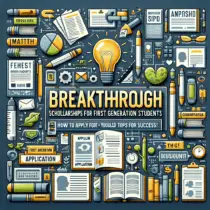Pursuing higher education can be challenging, especially for first-generation students. These individuals often face unique challenges, such as financial constraints and a lack of familial guidance in navigating the complexities of college applications. Fortunately, many organizations offer scholarships specifically designed to support first-generation students. This article will explore various scholarship opportunities available, detail the application process, and provide tips for success.
Understanding First-Generation Scholarships
First-generation scholarships are financial awards given to students who are the first in their families to pursue a higher education degree. These scholarships aim to reduce the financial burden and provide support and encouragement for these students. Eligibility criteria typically include being the first in one’s immediate family to attend college, demonstrating financial need, and maintaining a certain academic standard.
Types of First-Generation Scholarships
There are numerous scholarships available for first-generation students, each with its own set of requirements and benefits. Here are some common types:
- Merit-Based Scholarships: These awards are given based on academic achievement, extracurricular involvement, leadership qualities, or other talents.
- Need-Based Scholarships: Financial need is the primary criterion for these scholarships; they aim to help students who may not afford college otherwise.
- School-Specific Scholarships: Many colleges and universities offer their own scholarships specifically designed for first-generation students attending their institutions.
- Community-Based Scholarships: Various local organizations and community groups provide funds targeted at supporting first-generation college-goers from specific regions or backgrounds.
- Corporate-Funded Scholarships: Some businesses offer scholarship programs as part of their corporate social responsibility efforts to help deserving students achieve their educational goals.
How to Find First-Generation Scholarships
Finding scholarships can take time, but it is worth the effort. Here are some strategies:
- Online Scholarship Databases: Websites like Fastweb.com, Scholarship.com, and Cappex.com allow users to filter search results based on eligibility criteria such as being a first-generation student.
- College Financial Aid Offices: Most colleges have dedicated staff who can inform you about institutional scholarships available for first-generation students.
- Local Community Groups and Nonprofits: Organizations such as Rotary Clubs or local foundations often offer scholarships tailored to community members.
- High School Guidance Counselors: They can provide valuable information about various scholarship opportunities aimed at supporting first-generation college applicants.
- Employer-Sponsored Programs: If your parents work in companies that offer scholarships for employees’ children, inquire whether there are specific provisions for first-generation scholars.
The Application Process
The scholarship application process typically involves several steps:
- Researching Opportunities: Start early by compiling a list of potential scholarships you qualify for based on your background and achievements.
- Gathering Required Documents: Commonly required documents include transcripts, letters of recommendation, and essays or personal statements detailing your goals and challenges faced as a first-gen student.
- Completing Application Forms: Fill out each application form meticulously; double-check all entries before submission.
- Writing Essays/Personal Statements: Craft compelling narratives highlighting your journey as a first-gen student along with future aspirations.
- Submitting Applications on Time: Pay close attention to deadlines—late submissions may not be considered regardless of merit due to constraints imposed by funding bodies.
- Following Up if Necessary: Some programs might require interviews or additional information after the initial submission—stay prepared accordingly.
Tips for Writing Winning Essays/Personal Statements
Essays play an integral part in most scholarship applications because they offer insight into applicants beyond mere numbers (GPA/test scores). Here are some tips that could set yours apart:
- Be Authentic and Honest: Share genuine experiences related directly reflecting struggles/successes encountered being a first-gen scholar without exaggeration or excessive dramatization.
- Highlight Overcoming Adversity/Balancing Responsibilities: Emphasize how you managed balancing academics along with socio-economic responsibilities showcasing resilience and dedication towards achieving goals despite the odds.
- Showcase Future Aspirations: Clearly outline long-term career goals illustrating how receiving this particular award will facilitate reaching those milestones further cementing resolve towards contributing back positively to society through chosen profession/career path.
- Proofread Multiple Times for Clarity, Conciseness, and Grammar Accuracy: Avoid grammatical errors and redundancies, ensuring the essay flows smoothly conveying the intended message effectively without ambiguity or errors that could potentially detract the reviewer’s attention away from the core content/messages intended to be conveyed.
Acing Recommendation Letters
Strong recommendation letters significantly bolster any application packet. Here’s how to ensure you get the best possible endorsements:
- Choose the Right Recommenders Wisely: Select someone familiar with your work ethic, personal character traits, and professional capabilities demonstrated during your tenure under their supervision in an academic or workplace setting. Ideally, this person should have relevant contextual knowledge about you.
- Timely Requests: Allow adequate preparation time for your recommenders to craft thoughtful endorsements accentuating your strengths and suitability for the program applied towards achieving the stated objectives.
- Provide Key Points and Accomplishments: Briefly remind your recommenders of key points and accomplishments you want highlighted without sounding overbearing or presumptuous. Simply guide them towards emphasizing positive aspects essential for strengthening your overall candidacy.
- Follow Up Politely: Send gentle reminders as the deadline approaches, ensuring everything is submitted in a timely manner to avoid last-minute rush or miscommunication errors.
When done correctly, these steps collectively enhance your chances of successfully securing the desired scholarship, paving the way for brighter future prospects.
End Notes:
Please note: Information provided herein is subject to change and update periodically. To ensure accurate and current details, refer to the official websites of respective organizations providing detailed comprehensive guidelines, eligibility criteria, documentation requirements, submission deadlines, and other pertinent information related to the process of applying for scholarships specifically targeting and supporting deserving, meritorious, talented, hardworking, committed, passionate, driven, enthusiastic, motivated, and determined first-generation students seeking higher





